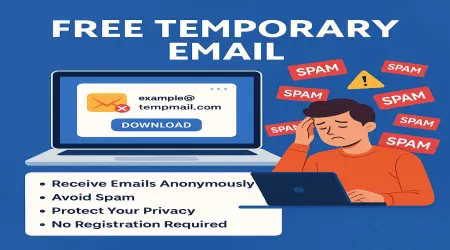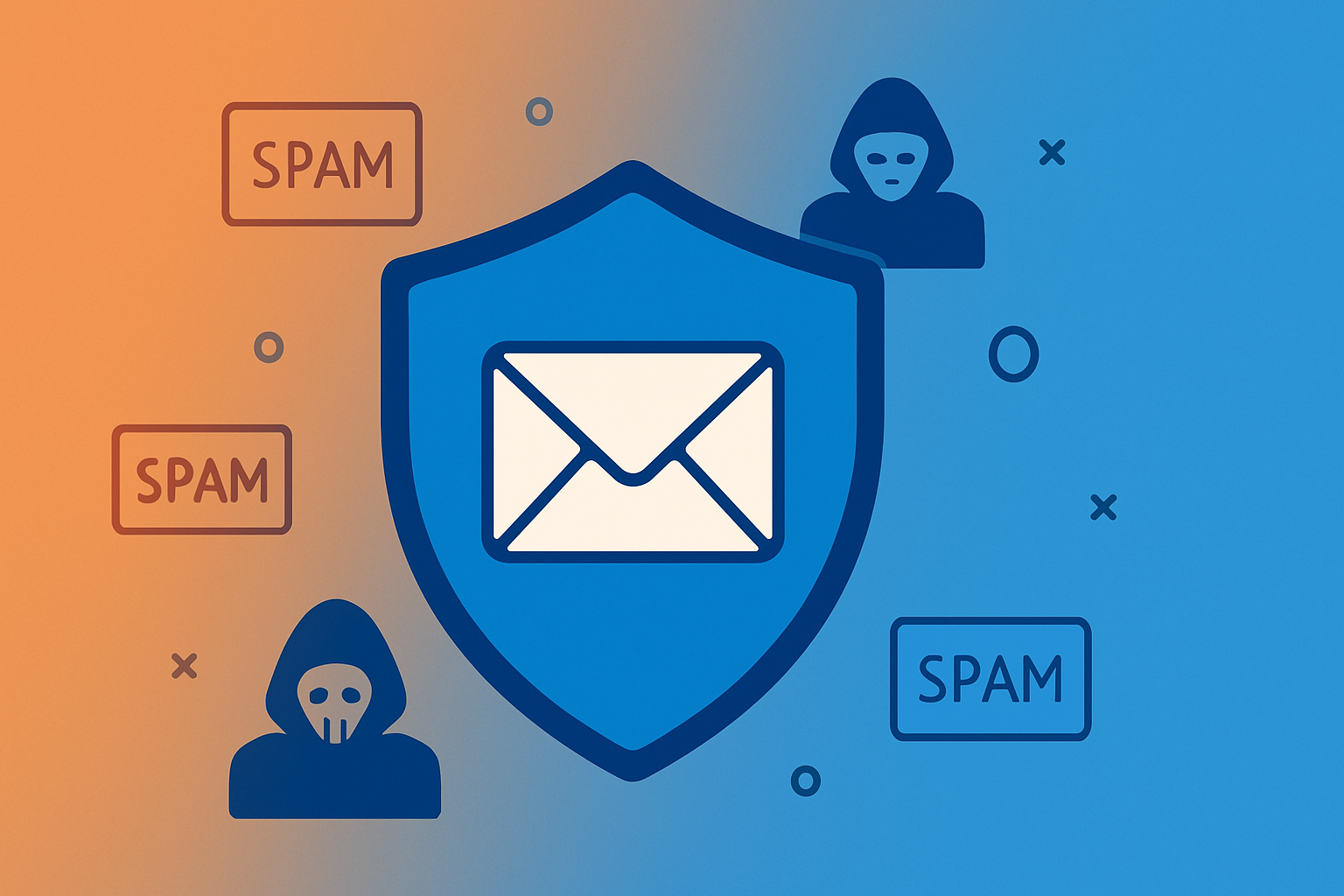

Best Temporary Email Services for Ultimate Online Privacy in 2025
Introduction
Email is still the backbone of digital communication in 2025. But with every newsletter sign‑up, online store purchase, or social media registration, your real email address risks being exposed to spam, data breaches, and trackers. For those who value privacy, the solution is simple: temporary email services.
Also called disposable or throwaway emails, these tools let you create instant, anonymous addresses that expire after a set time — perfect for registrations, free trials, or testing new websites. In this guide, we’ll explore the best temporary email services of 2025, comparing their features, privacy levels, and use cases so you can pick the right tool to stay safe online.
Why Use Temporary Email in 2025?
The need for disposable emails has grown dramatically due to:
Increased Spam: Over 50% of global email traffic in 2025 is spam.
Data Breaches: Millions of email addresses are leaked every year.
Aggressive Tracking: Marketers use email addresses to track users across platforms.
Anonymous Needs: People now manage multiple identities — professional, personal, and anonymous.
Temporary email services help solve these problems by offering privacy, speed, and convenience — with no need for long‑term commitments.
Key Features of a Good Temporary Email Service
When evaluating disposable email providers in 2025, consider these features:
Instant Address Generation – No sign‑up required.
Automatic Expiration – Emails self‑destruct after minutes or hours.
Privacy & Security – Minimal data storage, encryption, or alias options.
Cross‑Device Access – Works on mobile, desktop, and browser extensions.
Spam Filtering – Keeps malicious emails out of temporary inboxes.
Custom Domains – Ability to use your own alias or domain.
Top 10 Best Temporary Email Services in 2025
Below is a detailed review of the leading disposable email providers this year.
1. Temporary‑Email.net
Overview:
One of the most modern and privacy‑focused disposable email services in 2025, Temporary‑Email.net offers instant addresses, mobile compatibility, and auto‑deletion features. It’s ideal for users who want a simple yet secure solution for avoiding spam.
Key Features:
Instant random email address generation
Mobile‑friendly interface
Auto‑deletes after set time
Private inbox (not publicly searchable)
Pros:
Fast and free
Better privacy than older services like Yopmail
Clean interface
Cons:
No ability to send emails (receive‑only)
2. TempMail
Overview:
TempMail is a household name in disposable email. It’s widely used for quick sign‑ups and offers browser extensions and mobile apps, making it accessible on the go.
Key Features:
Auto‑refresh inbox
Multiple domain options
Apps for Android and iOS
Supports multiple languages
Pros:
Easy to use
Works across devices
Popular and widely supported
Cons:
Public inbox risk (shared domains)
Lacks advanced privacy tools
3. 10MinuteMail
Overview:
A pioneer in the disposable email space, 10MinuteMail provides exactly what its name suggests — emails that expire in 10 minutes. Perfect for quick verifications.
Key Features:
10‑minute expiration (extendable)
Minimalistic interface
One‑click email copy
Pros:
Extremely fast
Simple, no‑frills service
Cons:
Very short lifespan (unless extended)
Limited features compared to newer competitors
4. Guerrilla Mail
Overview:
Guerrilla Mail offers customizable usernames and supports encrypted message storage. It’s ideal for users who want slightly more control over their disposable addresses.
Key Features:
1‑hour lifespan (extendable)
Custom address creation
Spam filtering
Optional message encryption
Pros:
Customizable
Privacy‑friendly features
Cons:
Outdated UI
Public inbox risk
5. Teamail (Emerging Service)
Overview:
Teamail is a next‑generation disposable email platform launching in 2025, focusing on encrypted temporary emails and flexible expiration — a step up from traditional temp services.
Key Features:
Encrypted inboxes
Adjustable email lifespan
Clean, modern interface
Ideal for mobile users
Pros:
Strong privacy
Future‑ready features
Cons:
Newer service (smaller user base)
Limited advanced integrations
6. EmailOnDeck
Overview:
EmailOnDeck combines speed and security for one‑time verifications. It uses a two‑step generation process to reduce spam and bot activity.
Key Features:
Two‑step email creation
Works well for crypto and fintech sign‑ups
Good spam filtering
Pros:
Reliable and quick
Less crowded inboxes
Cons:
Basic interface
No mobile app
7. MailDrop
Overview:
MailDrop is developer‑friendly, offering disposable emails for testing APIs and web apps. It uses public inboxes with a focus on simplicity.
Key Features:
Public inbox system
API access for developers
Lightweight design
Pros:
Great for testing
No sign‑up required
Cons:
Public inbox risk
Basic spam filtering
8. ProtonMail Aliases (Alternative Approach)
Overview:
While ProtonMail is a secure permanent email, it also allows creating aliases for temporary use. This combines end‑to‑end encryption with spam protection.
Key Features:
Encrypted messages
Aliases for throwaway use
Strong privacy policies
Pros:
Secure and private
Long‑term option if needed
Cons:
Requires a ProtonMail account
Not purely “disposable”
9. AnonAddy
Overview:
AnonAddy offers open‑source anonymous email aliases, forwarding emails to your real inbox without revealing your identity.
Key Features:
Unlimited aliases
Open‑source code
Custom domain support
Pros:
Developer‑friendly
Excellent for privacy
Cons:
Requires some setup
Less “instant” than classic temp mail
10. SimpleLogin
Overview:
SimpleLogin is another alias‑based service, perfect for managing multiple disposable emails for personal and professional use.
Key Features:
Unlimited aliases
Easy to deactivate compromised addresses
Works with custom domains
Pros:
Flexible and privacy‑focused
Integrated with Proton ecosystem
Cons:
Paid features required for full use
Not “auto‑delete” like traditional temp mail
Comparison Table: Best Temporary Email Services (2025)
| Service | Expiration Time | Public/Private | Encryption | Mobile Support | Custom Aliases |
|---|---|---|---|---|---|
| Temporary‑Email.net | 10‑60 min | Private | No | Yes | No |
| TempMail | 10‑60 min | Public | No | Yes | No |
| 10MinuteMail | 10‑20 min | Private | No | Yes | No |
| Guerrilla Mail | 1 hour+ | Public | Optional | Yes | Yes |
| Teamail | Customizable | Private | Yes | Yes | No |
| EmailOnDeck | 10‑30 min | Private | No | Yes | No |
| MailDrop | 24 hours | Public | No | Yes | No |
| ProtonMail Aliases | Long‑term | Private | Yes | Yes | Yes |
| AnonAddy | Customizable | Private | Yes | Yes | Yes |
| SimpleLogin | Customizable | Private | Yes | Yes | Yes |
Security Tips for Using Temporary Email
Do not use for sensitive accounts (banking, government).
Pair with VPN to avoid IP tracking.
Check HTTPS on the disposable email website.
Avoid sharing temporary addresses publicly.
Use encrypted services (ProtonMail, Teamail) for extra privacy.
Temporary vs Permanent Email: Which Should You Use?
Use temporary email for:
Free trials and promotions
One‑time sign‑ups
Testing apps and websites
Anonymous browsing
Use permanent email for:
Work and personal communication
Banking and government accounts
Long‑term subscriptions
Recoverable accounts
Future Trends in Temporary Email (2025 and Beyond)
AI‑powered spam detection in disposable emails
Integration with password managers for seamless logins
Custom domain temporary emails for branded privacy
Blockchain‑based anonymous communication
FAQs About Temporary Email Services
Q: Are temporary email services legal?
Yes. They are legal to use but should not be used for fraud or illegal activity.
Q: Can I send emails from temporary addresses?
Most disposable services are receive‑only to prevent spam misuse.
Q: How long do temporary emails last?
Typically 10 minutes to 24 hours, depending on the service.
Q: Are temporary emails really private?
They hide your identity but may not be fully secure — avoid sensitive data.
Conclusion
In 2025, temporary email services remain one of the most effective ways to protect your privacy, block spam, and manage online sign‑ups. Whether you choose Temporary‑Email.net for simplicity, Teamail for advanced privacy, or AnonAddy for developer‑friendly aliases, disposable emails give you control over your digital footprint.
By combining temporary emails with VPNs, encryption, and good security practices, you can confidently navigate the web — anonymous, spam‑free, and secure.
Target Keywords:
temporary email services 2025, disposable email privacy, best temp mail, anonymous email tools, avoid spam email

